- Home
- Robin McKinley
Deerskin Page 14
Deerskin Read online
Page 14
Rumor and half-memory told her other things too, and hesitantly she greased, with the rendered fat of Ash’s kills, little enough as it was, the webbing on the snow-shoes, which in the long term may have been a good thing, but in the short term what she produced was a sticky mess. The neat, even-stretched weave became somewhat less neat and a good deal less tightly stretched, and the whole affair became infinitely less easy and more frustrating to handle. But Lissar persevered; perseverance was the central lesson of all she had learnt since … since Ash and she had first set out on their journey.
Lissar followed Ash slowly on her snow-shoes, each time wondering again at the vast space between the leaping pawprints and the descending pawprints. She began picking up dropped branches from the trees, and dragging them back to the hut; if she wanted winter never to end, she had to solve their second most pressing problem, their wood-store. Ash was doing her part; Lissar would try to do hers. As she looked for dead wood, peering at branches, a little more of her apprenticeship came back to her, and she recognized a few more edible plants available to her even in the winter. There were the dry, crumbly, tasteless but edible, shelf-like tree mushrooms. She painstakingly peeled bits of bark off young birch and caradal trees—not too much, not to kill the tree—and dug more roots along the occasional wet spots near the stream, although this always made her hip and shoulder ache. Tea she made from erengard leaves, and the bitter brew gave her strength.
Even without the added stress of digging her hip still hurt and prevented her from straying very far, although she found to her surprise that once she was accustomed to it, the odd tiptoe-and-slide motion necessary in the snow-shoes was gentler than ordinary walking, in spite of having to move wide-legged. Her arm now hurt only if she used it too strenuously, so she took it back out of its sling, though its range of motion remained very limited.
She had begun to keep track of each seven days as it passed But as she did not know how much time she had lost in coming to this place, and in the first exhausted days after, it was a rather whimsical exercise. But it gave her some few standards that her old habits of mind found comforting: she wore her sling for four spans of seven days, for example, before she took it off; and every seven days she treated herself to another bath.
As the weeks passed her wounds did appear to heal, and her skin grew smooth again, although some scars remained, and there was a tightness down the skin of her back and along one side of her neck that she assumed was also scars, though she could see neither, and the sensations under her fingers were inconclusive. The part of her back that her stiff shoulder would not let her touch remained unexplored, and there was a space down her jaw and throat that had no feeling at all, which was confusing, and she could not there read what her fingers told her. She was not sorry for the lack of any looking-glass.
She and Ash did not eat so well—or perhaps it was that they worked so hard—that their ribs ever disappeared under a layer of flesh which, in winter weather, might have been a pleasant thing to have. But Lissar noticed that her arms and legs, even the weak shoulder and painful flank, developed a new kind of wiry roundness, that of muscle; and she was both pleased and puzzled by this, for she knew that this, too, was new to her. Had she led so lazy a life before then? Perhaps picking herbs, and bundling them to dry (and brushing away the ants and spiders), and learning their names, was not such arduous work. Perhaps someone else had chopped the wood for Rinnol’s stove.
Ash’s wounds disappeared completely; even ruffling the fur down her back, Lissar could not see exactly where her hurts had been. The one reminder of her ordeal was a knot to one side of the base of her skull, a small knot, much smaller than the original swelling, and much less tender. But it was still there, and still sore to the touch. Ash winced away when Lissar’s hand found it.
But something troubled Lissar still, something beyond all the shadows in her mind: something real, tactile, immediate. Her own ribs still showed, and the new solidity of her limbs was muscle; but her belly grew bloated, till the skin stretched tight over it. Each week for several weeks now she had rubbed her belly when she took her bath, and wondered, and she looked at herself again on this particular afternoon and wondered again. At first she had been able to ignore it, to suppose she was imagining it, but that was no longer possible. The bulge was bigger than it had been, and unmistakable, and her body seemed to have rearranged itself somehow around it. Her ribcage was a different shape, and the slope of her breasts seemed changed. The wondering was not easy or comfortable, and the uneasiness moved into her stomach, and she felt dizzy and ill.
Had she worms, perhaps? But she had examined her own feces, and Ash’s as well, and found no signs of worms; and the dubious meat she cooked for them was boiled very well before they ate it. Perhaps her distended belly was caused by some form of malnutrition; she had heard of such things, as Rinnol’s apprentice, of herbs and green leaves to banish such afflictions. Ash’s needs as a dog were different; perhaps some human need was being overlooked.
She remembered what she could, but it was winter, and there was little green to be had; nor had Rinnol time to teach her everything, and Lissar could remember nothing specific of an antidote to this odd sort of belly-bloat … she tried to remember what she did know of the causes of any kind of belly-bloat … Rinnol had not had time to teach her everything … it would have taken years, and Lissar had been her student only some months, and an unofficial student at that … reasons for belly-bloat, and a sudden image of blood flowing between her legs; her Moon-blood, which she had not seen since she and Ash had begun the journey that had brought them here; but it was not Moon-blood that ran down her legs … Lissar’s breath came short, and the words fell into her mind like blades, like flaming arrows, and there were none on the walls to defend her, the guardians were dumb, dead, escaped, banished, crippled … an unofficial student, for Rinnol never quite forgot that she was telling her king’s daughter what to do …
Rinnol.
King’s daughter.
Her swollen belly …
The panic roared at her, a red mouth opening, a monster with jaws gaping wide enough to swallow her, and within its gullet the sight of her father’s face as he turned from Ash’s body, no longer human as he loomed over her, his striking hands larger than boulders, his body huge as a mountain, blackening the sky and the white snow, tearing the vision from her eyes, smashing her to the floor with the weight of an avalanche.
What brought her back to animal wakefulness was a terrible, seizing cramp in her belly. There was blood on the floor beside her, pooling beneath her outflung legs. The pain came again, doubling her over; her breath came out with a jolt, jerking from her half a grunt, half a cry.
There was a noise at the door.…
But it was Ash; Ash had returned.
Lissar struggled up off the floor, seizing her blanket-towel to wrap around her against the cold, and opened the door. Ash leaped in and flung a squirrel at her feet, and then nosed at her anxiously, smelling blood, perhaps feeling the tremor of another spasm passing through the body of her person. Lissar, without thinking, let her desperate fingers claw down beneath Ash’s chin, and cling there.
She sank slowly to her knees, her hands still clinging around Ash’s neck, and pressed her face against Ash’s breast, feeling Ash’s wet nose against her cheek, and suddenly loud whuffly breathing in her ear, thinking, Ash has adapted to this life. So can I. So can I. And a pang ripped through her so sharply that she screamed.
She slipped into timelessness, into a space where she bore what she did because choice had withdrawn itself from her. She did not think in terms of living and dying because she was beyond thought. She paced when she could not lie still, and lay still when she could not move. But she did not sleep, and lay down seldom, and the earth’s evening and night passed, and by dawn she was exhausted; exhausted enough that she no longer knew the difference between her private visions and the snow and trees and the hard blood-stained floor of the cabin.
She
saw a tall man who stood laughing beside her, a man she feared with all her heart and soul, despite the great crowd surrounding them that insisted he was her friend, insisted in a susurration of voices that sounded like the pleas of the damned. As she cowered away from the man, he opened his mouth to laugh the louder, for it seemed that her fear amused him, and she saw that he had the fangs of a wild animal, and the long curling fiery tongue of a dragon.
She turned and fled, flinging herself through the door of the hut, into the snow and the icy light of fading stars and rising sun. Her staring eyes saw only the vision her terrified mind could not dislodge, and her ears heard the roaring that was her heartbeat, but which she believed to be the man-dragon, and the screams she believed were the crowd, but were from her own dry throat.
The snow hampered her, and that part of her body that still wished to live ignored the ravings of her mind and began desperately to shiver; for she had run outdoors naked, and she would not last long in this cold, if nothing brought her back to her ordinary senses.
What she saw instead of snow and trees and the cold dawn sky as she ran from the man-dragon, looking fearfully over her shoulder as she stumbled and wavered and dragged herself along, was a great woman’s face rising up even higher than the man’s tall figure; and the woman was laughing too, and her headdress was made all of fire, as were her scarlet finger-nails, as she reached out around the man-dragon, toward Lissar, her arms longer than any human being’s, as long as the flight of an arrow from a strongly stretched bow, and they came on as rapidly as arrows: her scarlet fingernails were tiny worms of flame, with glittering eyes, and mouths that opened and hissed; and each mouth was as large as one of Lissar’s hands, and there were words in the hisses, and the words were At last.
The earth, Lissar believed, quaked under her, as her feet stumbled over the writhing backs of more fire-worms, but these were large, their rounded backs wider than her hopeless feet, and now the long fire-tipped arms had reached past her, and the wrists bent inward, and the fingers stretched back toward her as she ran, so close that she could feel the hot breath of the tiny hissing mouths on her fevered face; and she slowed to a halt, appalled, for she could not run toward or away any longer. She recognized she was trapped, and as she began to turn, to look back behind her, the vivid backs of the fire-worms still heaving beneath her feet, she felt the man-dragon’s hand on her shoulder, and she knew she felt her death.
But then a strange calm coolness banished the fire and the pain; and then it was coolness no more, but warmth, a beautiful warmth with a beautiful silence; and then it was silence no longer either, but a sound like bells, or not quite like bells, but something like the sound that trees might make if they tried to speak with human voices, for the sound had a good deal of the sweet murmur of running water about it.
Lissar knew that she lay curled up on something soft, but she did not open her eyes, for her eyes would see nothing of what she was seeing now, a tall, black-skinned, black-haired woman who sat beside her, with one cool-warm hand on Lissar’s cheek. But no, the hand was white, and the woman’s skin was white, as was her hair; and then as she turned her face toward Lissar she was both black and white, shadowed and unshadowed, a blackness with a light upon it and a whiteness shining from the dark.
“My poor daughter,” she said, and her voice was like bells and running water, and Lissar saw that both her white-black skin and hair had green gleams, and her slender fingers had a translucence almost like the first leaves of spring. Her hair was the white of apple-blossom, and the black of a deep hollow in an old tree; and she wore a long robe which was both black and white, and it shimmered with an iridescent green, like water in sunlight. She raised her hand gently from Lissar’s face, and as she spread her fingers, Lissar could see through the flesh between her thumb and first finger, as if a candle were burning just behind her hand, as if her hand were itself the sun.
“My poor daughter,” she said again. “But rest you now with a quiet mind and heart, for this short story within this life’s journey has an ending you may call happy, which makes you one of the fortunate ones. Rarely does fate’s wheel turn so quickly for any soul.” She paused, and stroked Lissar’s hair, and Lissar thought she had never experienced anything so wonderful as the woman’s touch.
“Or perhaps my hand has given the wheel a spin; for I do not, sometimes, see that suffering to break any creature’s spirit is so excellent a thing. My world is a small one, I know, and like to remain so, for I spend perhaps too much time and strength pitting myself against the great wheel.” She laughed a small chiming laugh, and Lissar nestled down more contentedly, for the woman’s words stroked her as gently as did her hand, and while she did not understand the meaning of the words, they soothed her, like a mother’s bedtime story to a child too young to know language.
“But my world shall thus stay small, for I will go on so pitting myself, and spending such power as I have, and will never, perhaps, be willing to accept that simplicity—that lonely simplicity—that would lift me out of this world forever.…” She laughed again. “And why, then, do I tell you this? I recognize something of myself in you, perhaps: the obstinacy, perhaps; or perhaps I know the one who keeps you company. Wake, my child, for someone who loves you wants comforting.”
But Lissar’s eyes stayed tightly closed. She did not want to wake. She knew too much about waking, for she had been called away from peace back into pain before, and she did not want to go through that again. She wanted to stay just where she was, and sleep forever.
But the woman would not let her. “Wake up, my child. I have given you several gifts, and the world is not as you have feared it, or not wholly so, and I would give you to see the things that are good and kind, for I think you have seen enough of the other. I have given you the gift of time, first; but I have given you other gifts, one that you must discover and one that you must seek. But wake you shall, for I will not have my gifts wasted.” And Lissar accepted that the woman knew her better than she knew herself, and that since she believed Lissar would wake, then wake Lissar must.
She opened her eyes as reluctantly as she had ever done anything; she knew that as soon as she opened her eyes she would be … where? Memory returned to her cautiously, forming at some little distance from her, that she should glance at it only, not feel it, not let it sink through her, spoiling her peace and comfort: she remembered her last bath, the blood between her legs, leaping out into the snow to escape the man-dragon … the memory blurred and fell away from her even as she thought it, crumbling to nothingness like the mysterious contents of an ancient box or trunk or cupboard, opened at last and exposed to sunlight: for a moment the relics stand sharp and clear, but at a touch they fall to ashes, impalpable to the surprised hand, lingering only long enough to make the seeker sneeze.
What remained was a sense of the Lady, of her voice, the touch of her fingers, the calm of knowing that the Lady had intervened on Lissar’s behalf. The peacefulness was a part of the intervention; Lissar knew she was grateful, beyond grateful, for having been plucked up from her old fate and set down again, facing some new direction, leading to some new fate; but the memory of why she had needed the intervention was an empty, battered trunk or box or cupboard.
No, Lissar thought very quietly. It is not empty; but I can close it for now, and put it away. I will draw it down later, and open it again; but the Lady has given me time and healing, time for healing. I will be strong again when I open that box; strong enough to open it. My strength now is to set it aside.
And she opened her eyes, blinking.
FOURTEEN
ASH LAY, NOSE ON PAWS, SO NEAR TO HER THAT AS LISSAR OPENED her eyes she recognized that her cheek was being tickled by Ash’s whiskers, where the Lady’s hand had touched her; and Ash was lying where the Lady had sat. And as she opened her eyes, Ash looked into hers, and a great shudder of relief and excitement went through her, and she leaped to her feet and gave one short, wild, delirious bark; and she never barked.
> Then she stood, her newly plumy tail whisking madly back and forth. For the first thing that met Lissar’s gaze and understanding was that the silk-furred Ash, whose belly had once shown pink through the light soft down there, had grown a rich, curling coat like one of the great mad-eyed wolf-hounds of the far north. She was still silver-fawn; but as she moved her coat rippled, and when she flung her head back her long fur fanned out like a horse’s mane. Lissar stared, astonished, thinking, This is the Lady’s doing; this is one of the Lady’s gifts.…
Lissar sat up. She lay on a little grassy—grassy—mound, surrounded by violets; their perfume was in her nostrils. She had thought it was the smell of the Lady. Around her there were still a few patches of snow, and melt-water ran in rivulets everywhere she looked, though where she lay was quite dry and warm.
As she turned her head to look around her in her amazement, something brushed against her face, and she recognized a wisp of her own hair only after a moment’s startled thought. For her hair was soft to the touch, cleaner than a bucket of tepid snow-water and a little harsh soap could make it; and, furthermore, it was combed and smooth and bound up on her head, and there was nothing in the hut for a comb but her own fingers. There was another surprise for her: she reached up to stroke her own hair wonderingly and as she drew her hand down again let her fingers trail against the side and back of her neck, and found there no numb places, but only smooth, yielding, feeling skin.
She climbed to her feet, her brain dazedly acknowledging that her hip no longer hurt and each arm swung as freely as the other—suddenly remembering that she had touched the top of her head, investigating the way her hair was twisted in place, with both hands, and yet the one she had not been able to raise above waist level since she and Ash had escaped into the mountains.

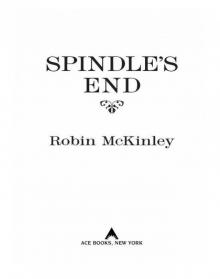 Spindle's End
Spindle's End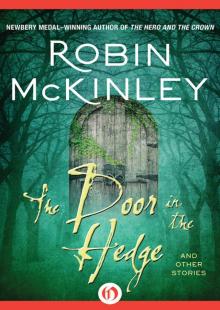 The Door in the Hedge: And Other Stories
The Door in the Hedge: And Other Stories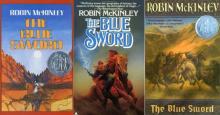 The Blue Sword
The Blue Sword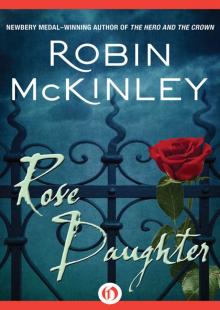 Rose Daughter
Rose Daughter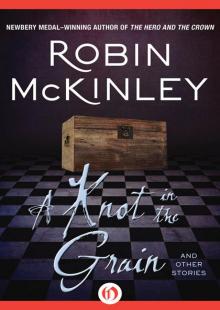 A Knot in the Grain and Other Stories
A Knot in the Grain and Other Stories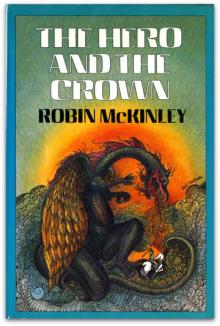 The Hero And The Crown
The Hero And The Crown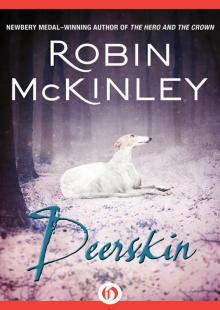 Deerskin
Deerskin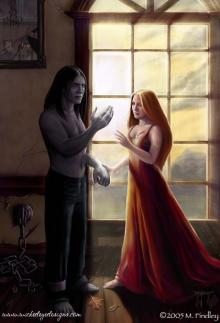 Sunshine
Sunshine Beauty: A Retelling of the Story of Beauty and the Beast
Beauty: A Retelling of the Story of Beauty and the Beast Shadows
Shadows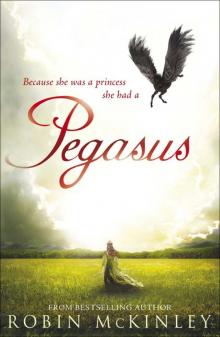 Pegasus
Pegasus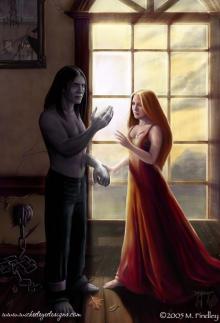 Chalice
Chalice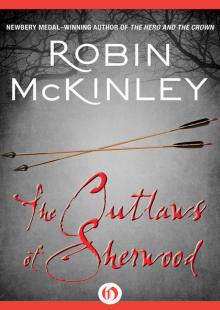 The Outlaws of Sherwood
The Outlaws of Sherwood Fire: Tales of Elemental Spirits
Fire: Tales of Elemental Spirits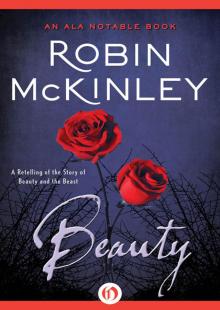 Beauty
Beauty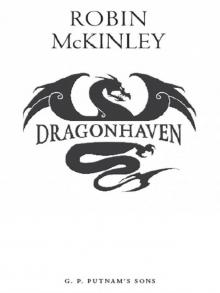 Dragon Haven
Dragon Haven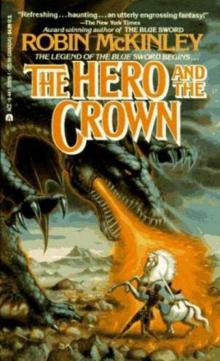 The Hero And The Crown d-2
The Hero And The Crown d-2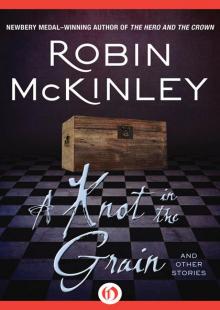 A Knot in the Grain
A Knot in the Grain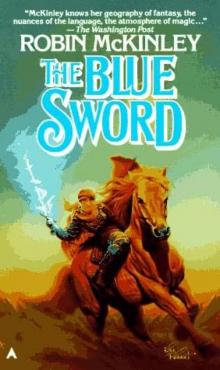 The Blue Sword d-1
The Blue Sword d-1 Beauty (v1.2)
Beauty (v1.2)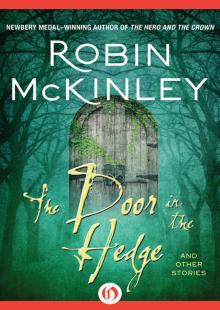 The Door in the Hedge
The Door in the Hedge